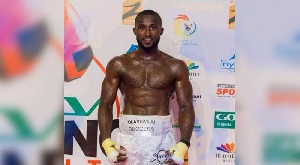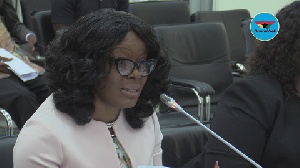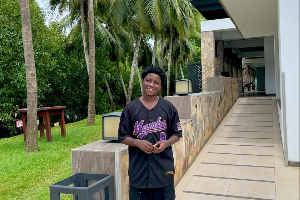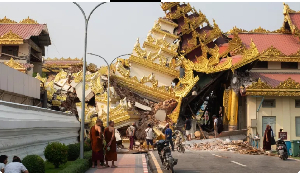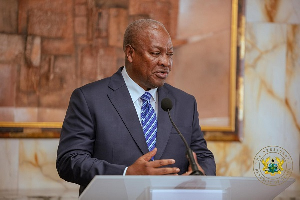Ghana’s 64 years of Independence was marked on Saturday without the usual “march past”.
That should not be surprising due to the novel Coronavirus pandemic.
But did you know that there were other unique celebrations at 10-year intervals - in 1961, 1971, 1981, 1991, 2001, and 2011?
Independence Day 1961
In 1961, Queen Elizabeth II planned to visit Ghana to cement relations with her former subjects.
But before she left on the trip, which was to take place from November 9 to 20, British MPs and the British people generally did not want her to embark on the trip.
Reason?
There were rising tensions in Ghana because President Kwame Nkrumah was well on his way to becoming a dictator.
The British were wary of the visit becoming too dangerous.
As confirmation of these tensions, five days before Queen Elizabeth's trip was to begin, bombs went off in Accra.
A statue of Nkrumah was hit, which showed that the President was a target.
Concerns were heightened about the Queen’s safety and collateral damage while she was in the same place with Nkrumah.
But Queen Elizabeth insisted on going to Ghana despite the danger involved.
One reason she was reluctant to reschedule was that she had already cancelled an earlier trip in 1959 when she became pregnant with Prince Andrew.
And though Ghana was part of the Commonwealth, along with other nations that had been part of the British Empire, she knew Nkrumah was getting restless.
As head of the Commonwealth, the Queen did not want to insult or embarrass Ghana by postponing the visit, which could push Nkrumah into leaving the Commonwealth altogether.
Thus, from the moment Elizabeth arrived in Ghana, along with Prince Philip, her husband, she was surrounded by crowds and excitement - an obvious political victory for Nkrumah.
At a state dinner, Nkrumah toasted Elizabeth by saying, "The wind of change blowing through Africa has become a hurricane. Whatever else is blown into the limbo of history, the personal regard and affection which we have for Your Majesty will remain unaffected."
Elizabeth replied by saying that nations of the Commonwealth could disagree without members needing to leave - another score of victory for Nkrumah.
Elizabeth also captured attention by dancing with Nkrumah. Having the queen and a former colonial subject arm-in-arm on the dance floor was a way to demonstrate her acceptance of a new footing between their countries.
What about 1971?
On March 6, 1971, as Ghana was commemorating its 14th anniversary of Independence, a ‘Soul to Soul’ concert was held under President Edward Akufo-Addo and Prime Minister Kofi Abrefa Busia.
This concert was filmed as a documentary and released in August 1971.
The film had live performances as well as the artist’s interactions with the citizens of Ghana.
Maya Angelou, an author and poet, first introduced the idea to Kwame Nkrumah but Nkrumah was not able to bring the idea into fruition.
Ed and Tom Mosk, however, approached the Ghana Arts Council about the formation of a show in 1970 and the Council agreed.
The Mosks were inspired by a show headlined by James Brown in Lagos, Nigeria, that occurred in 1970 as well.
The stars that featured in the Soul to Soul concert included Ike and Tina Turner, Wilson Pickett, The Staple Singers, and Santana.
Some of the Ghanaian musicians on the bill were Guy Warren also known as Kofi Ghanaba, The Damas Choir, and The Kumasi Drummers.
And 1981?
Dr. Hilla Limann of the People’s National Party (PNP) was now civilian elected President after almost a decade of military coups and counter-coups. The economic hardships of the military years still had a strong negative effect on this nation. However, the great feat President Limann, a Catholic, achieved in getting Pope John Paul II to visit Ghana was still fresh on the minds of the people. Further, Limann placed the heavily indebted 24-year-old nation back on the map of global diplomacy.
The year 1991?
Military ruler Jerry John Rawlings had gotten Chinese help and architecture to reconstruct the Independence Square beginning immediately after the 1989 celebrations.
Apart from the Independence arch, the concrete seats we see today were introduced by Rawlings to replace metal stands that made the Independence Square more like the seats at the Liberty Professionals’ Carl Reindorf Park in Dansoman, Accra.
Ghanaians having missed the "march past" in 1990, when the contingent of school children and security services were bussed to the Accra International Trade Fair Centre, the 1991 celebrations were spectacular despite the usual heat.
This makes 1991 and 2021 the only occasions in living memory when there was no “march past” by school children and security services.
Sadly today, the concrete seats which have since been overlain with plastic seats are in serious need of maintenance.
It is no secret that part of the reasons for the 2018 and 2019 celebrations being moved to the Tamale and Kumasi respectively is because of the disaster-prone nature of Independence Square, Accra, where our favourite “march past” and “eyes right” take place.
The 2001 first-ever democratic transition celebrations
Ghana successfully changed power from JJ Rawlings to JA Kufuor on 7 January 2001.
This celebration was unique because a lot of Ghanaians were wondering whether on March 6, 2001, President John Agyekum Kufuor, then 62 years old, could stand for the three to four hours military ruler Jerry Rawlings had been doing, while acknowledging the yells of “eyes right” from the leaders of the contingents as they march past the Presidential dais.
But more importantly, Ghanaians wanted to see, “feeli feeli” whether the security services whom Rawlings had single-handed recruited and nurtured for the greater part of 19 years, would salute and show loyalty to JA Kufuor.
Hence, when they did, the reciprocal speech Kufuor gave could not be glossed over.
President Kufuor referenced the National Reconciliation Committee, which he had earlier proposed in his State of the Nation’s to Parliament, and intoned through the speakers at the hot and humid Independence Square: "We need to be reconciled for our land to be healed."
Atta Mills’ 2011
Teachers boycotted the Independence anniversary parade as a way of fighting for upward salary adjustments.
In his Presidential address, therefore, President John Evans Atta Mills, dedicated the day to the youth of Ghana.
“The future of Ghana belongs to you the youth and on a day like this, it is only right and proper that you are allowed to be in the forefront of our Independence Day celebrations,” Atta Mills declared, while the teachers who usually train and lead the contingent of school children were palpably absent.
But unfazed by the embarrassment, Atta Mills went on in his trademark repetition style:
“It is only through discipline and hard work that you will be able to take advantage of the opportunities that will come your way.
“It is only through discipline and hard work that you will be able to take over from us and become the future leaders of Ghana.
“Indeed, if you did not hold on to the principles of discipline and hard work, you would not have acquitted yourselves well this morning with your brilliant display of marching and gymnastics skills.”
Atta Mills was a professor, and having taught at the university for so many years, he had mastered how to speak in public, without intimidation.
And finally what’s good about 2021?
Due to the novel Coronavirus, President Nana Addo Dankwa Akufo-Addo suspended the usual national, regional and district parades, aka “march past”.
The President and a few security services personnel had a mini-parade at the Jubilee House that could be likened to the changing of the guard ceremony.
Clearly, the best way to observe the celebrations this year obviously is to physically distance ourselves and stop the spread of the virus.
General News of Sunday, 7 March 2021
Source: www.ghanaweb.com



